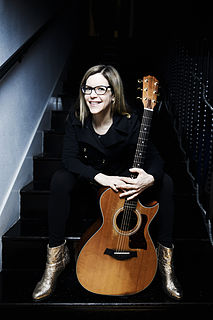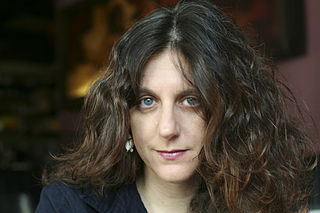A Quote by Emily Gould
Nothing trains you better to write fiction than being really good at writing about your own interiority.
Related Quotes
I don't want to write poems that are just really clear about how I'm aware of all the traps involved in writing poetry; I don't want to write fiction that's about the irresponsibility of writing fiction and I've thrown out a lot of writing that I think was ultimately tainted by that kind of self-awareness.
I feel like some sort of fiction-writing hobo, jumping trains and always hoping I'll find a good place to start a fire in the next town. And I keep having these panicky episodes where I corner my husband and rant at him: 'I don't have anywhere to write! I can't write! I don't have a place to write!'
There's nothing better than being your own boss, especially after when you play soccer, you're just controlled by so many different forces. So owning your own company and being your own bosses, it's so liberating and freeing and you get to finally make decisions for yourself, which I think is really powerful.
I write fiction longhand. That's not so much about rejecting technology as being unable to write fiction on a computer for some reason. I don't think I would write it on a typewriter either. I write in a very blind gut instinctive way. It just doesn't feel right. There's a physical connection. And then in nonfiction that's not the case at all. I can't even imagine writing nonfiction by hand.
You'd better discover a more important motive than publication for your work or else you'll go crazy. My sense is that you'll be writers only if you are convinced that to write is something for which there is no substitute in your life. You must therefore be ambitious for your work rather than for its promotion. The good news here is that if you assign secondary importance to publishing and primary to writing itself, you will write better, and will thus increase your odds of getting publishing.
You have to surrender to your mediocrity, and just write. Because it's hard, really hard, to write even a crappy book. But it's better to write a book that kind of sucks rather than no book at all, as you wait around to magically become Faulkner. No one is going to write your book for you and you can't write anybody's book but your own.
You've got to be a good reader. So whatever genre that you're interested in, read a lot of books about it and it's better than any kind of writing class you'll ever take. You will absorb techniques and then in a lot of cases you can just start writing using the style of the book or the author that you admire and then your own style will emerge out of that. Be a diligent reader and then try to write seriously, professionally and approach everything in writing in a professional way.
It means abandoning being a poet, abandoning your careerism, abandoning even the idea of writing any poetry, really abandoning, giving up as hopeless - abandoning the possibility of really expressing yourself to the nations of the world. Abandoning the idea of being a prophet with honor and dignity, and abandoning the glory of poetry and just settling down in the muck of your own mindYou really have to make a resolution to write for yourself, in the sense of not writing to impress yourself, but just writing what your self is saying.
Imagination, it turns out, is a great deal like reporting in your own head. Here is a paradox of fiction-writing. You are crafting something from nothing, which means, in one sense, that none of it is true. Yet in the writing, and perhaps in the reading, some of a character's actions or lines are truer than others.







































